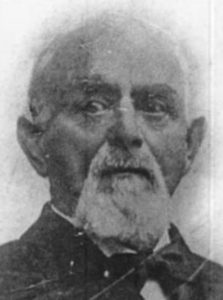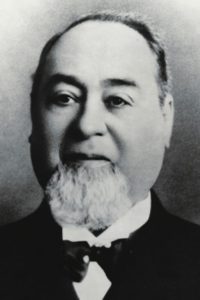Inventors of Your Favourite Pants

Jacob Davis
Jakobs Jufess (1831-1908) was born in Riga, Latvia. He became a tailor before immigrating to the US at age 23. Upon arriving in New York, he changed his name to Jacob Davis and opened up a tailor shop. Over the next 15 years, he moved all across North America trying to make a living, spending time in Maine, California, Nevada, and British Columbia, working as a tobacco salesman, gold miner, and brewer. By 1869, Davis settled in Reno, Nevada and opened another tailor shop. His primary merchandise was originally tents, horse blankets, and wagon covers. To make his stuff stronger and more durable, he started using the toughest cotton denim he could find, which happened to come from a small dry goods store in San Francisco called Levi Strauss & Co.

Levi Strauss, the name behind Levi’s jeans.
Levi Strauss (1829-1902) was born in Buttenheim, Germany. When he was 18 years old, his family immigrated to the US, joining two older brothers that had settled in New York some years earlier. The brothers had set up a dry goods shop, and Levi went on to open a new store location in Louisville, Kentucky. During the California Gold Rush, the family saw opportunity in the West and opened another branch in San Francisco. Strauss headed that branch (together with his sister’s brother, David Stern), importing from his brothers in the East and selling high-quality merchandise at his Levi Strauss & Co. shop. He became very wealthy, and built San Francisco’s first synagogue, Temple Emanu-El. Strauss gave generously to many charities, too, and his Levi Strauss Foundation donated to multiple orphanages and universities (including UC Berkeley). In 1871, Strauss received an offer from Jacob Davis to go into business together. Davis had designed a new type of work pants using blue denim and copper rivets to make the material extra strong. The first set of such “jeans” was custom-tailored for a lumberjack. Before long, everyone wanted a pair, and Davis couldn’t keep up with demand. Strauss helped Davis get the proper patents, and the two partnered up. To make his jeans distinct, Davis soon started to sew the back pockets with the now-ubiquitous orange double-stitch. Meanwhile, Strauss built a large jeans factory in San Francisco and Davis moved there to run the plant. Davis worked at the plant for the rest of his life, outfitting every miner, railroad worker, and cowboy with “Levi’s jeans”, his special pants. The modern jeans that Davis and Strauss brought to the world grew rapidly in popularity, first in the workforce, then among teenagers and “greasers” in the 50s and 60s, and today being the most popular type of pants in the world.
Coronavirus and the Coming of Mashiach
Words of the Week
Few are guilty; all are responsible.



